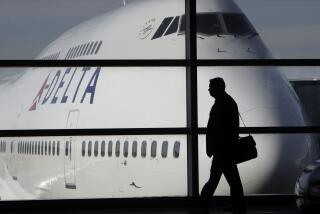More Fans Drawn to Orbitz Even as Criticism Grows
- Share via
Online travel site Orbitz stirred controversy even before it was launched nine months ago, and its critics are still bellowing. But there’s a new twist: Orbitz now has a growing legion of fans among consumers.
Orbitz has rocketed to the top ranks of the Internet travel industry, even as it faces louder protests from its rivals and investigations by the Transportation and Justice departments for possible antitrust violations.
The Transportation Department recently asked for more information from Chicago-based Orbitz and others in the industry and noted that Congress also asked the agency to investigate Orbitz’s business.
Orbitz was founded by the five largest U.S. airlines, which poured $150 million into its development. Its critics contend that the service gets deeply discounted seats from the carriers under marketing agreements that aren’t available to other travel agencies. These are usually the “Web-only fares” also sold on the airlines’ own Internet sites. Federal regulators are looking at whether through this arrangement Orbitz effectively represents collusion among the airlines that would give them a stranglehold on the market and curb competition.
“We welcome competition as long as it’s fair,” said Antonella Pianalto, executive director of the Interactive Travel Services Assn., a trade group for online travel firms. “When Orbitz has fares that no one else has access to, that’s not fair competition.”
Orbitz freely acknowledges that it’s arranged to sell the cheapest fares available from those airlines and some other carriers in exchange for providing sophisticated Internet technology that helps the airlines drive down their costs of distributing tickets. Orbitz claims it can save an airline up to 30% compared with peddling tickets through other channels. But Orbitz, which denies any wrongdoing, says its service is unbiased and predicts the government will agree.
“We have no exclusive right to any fare,” and the airlines are free to sell their cheapest fares to any other firm if they want, said Jeff Katz, Orbitz’s chief executive. He added that Orbitz provides “no preference for one airline over another.”
Regardless, the flap over Orbitz is likely to intensify because the online travel business--which already accounts for more than 10% of airline purchases--is expected to grow more sharply in the coming years. In January, 47.5 million U.S. visitors booked $2.3 billion of travel on Internet sites, and both levels were monthly records, according to research firm ComScore Networks Inc.
The airlines, anxious to cut costs further, stopped paying basic commissions to travel agents who book their flights. That’s expected to force most agents to charge higher fees to consumers, in turn driving more consumers to book on the Internet, on which they can find the cheapest fares and minimal fees.
And there are plenty of Internet competitors vying for their business. They’re led by Expedia Inc., which recently sold majority ownership to Barry Diller’s USA Networks Inc., and Travelocity.com Inc., which is majority owned by Sabre Holdings Corp., a leading computer reservations system provider for travel agents.
Right behind them is Orbitz, which was formed in late 1999 by UAL Corp.’s United Airlines, Delta Air Lines Inc., Northwest Airlines Corp. and Continental Airlines Inc. AMR Corp.’s American Airlines signed up later, and more than 40 other carriers also have reached marketing pacts to put their best fares on Orbitz. Overall, Orbitz has access to 455 airlines and hundreds of hotels, car rental agencies and other travel service firms.
From the start, Orbitz raised hackles of rival online sites and other critics because of its airline ownership, even though two of the major critics, Expedia and Travelocity, had a big head start in the online travel business.
Their complaints about Orbitz is “a little like Coke and Pepsi teaming up to run Dr Pepper out of the market,” said Orbitz’s Katz.
And the critics weren’t appeased when the Transportation Department, after an initial review, gave Orbitz the green light to open last year. Now, with regulators poring over Orbitz again, the critics expect a different outcome.
“We’re clearly pleased the [Transportation Department] is launching this new investigation,” Sabre spokesman Michael Berman said. Noting Orbitz’s contention of having better technology that makes its site so appealing to travelers, Berman said, “It’s not really that significant a technology. There’s something else giving them an advantage, and we think the ... investigation will prove that.”
Transportation Department spokesman Bill Mosley said regulators are investigating not only “whether Orbitz could be a vehicle for airline collusion,” but also whether federal regulations covering Sabre and the other computer reservations system operators should be overhauled to cover online travel sites. Currently they do not.
Alex Zoghlin, Orbitz’s chief technology officer, said the site’s fast growth reflects its consumer-friendly design, its ability to sift through billions of fares and flights at lightning speed and its quick response to travelers’ problems.
“We are 100% focused on how consumers interact with us,” he said, and “we leave no stone unturned to drive down the distribution costs” for the airlines, which in turn keeps down fares.
Katz also said Orbitz was growing rapidly because “consumers have told us loudly that they like it.”
But Orbitz’s rivals aren’t buying it, declaring that its airline ownership gives it an unfair edge.
“If Orbitz continues the way it’s continuing, it will eliminate competition,” said Pianalto of the travel services association. “If we want competition in airline pricing, you have to have independent sites out there forcing the airlines to compete, and they don’t have to do that on Orbitz.”
More to Read
Inside the business of entertainment
The Wide Shot brings you news, analysis and insights on everything from streaming wars to production — and what it all means for the future.
You may occasionally receive promotional content from the Los Angeles Times.











